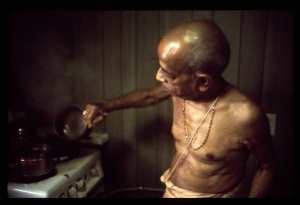CC Adi 17.44

A.C. Bhaktivedanta Swami Prabhupada
TEXT 44
- hāḍike āniyā saba dūra karāila
- jala-gomaya diyā sei sthāna lepāila
SYNONYMS
hāḍike — a sweeper; āniyā — calling; saba — all; dūra karāila — caused to be thrown far; jala — water; gomaya — cow dung; diyā — mixing; sei — that; sthāna — place; lepāila — caused to be smeared over.
TRANSLATION
They called for a sweeper [hāḍi], who threw all the items of worship far away and cleansed the place by mopping it with a mixture of water and cow dung.
PURPORT
The men in Vedic society who engage in public sanitary activities like picking up stool and sweeping the street are called hāḍis. Sometimes they are untouchable, especially when engaged in their profession, yet such hāḍis also have the right to become devotees. This is established by Śrī Bhagavad-gītā (BG 9.32), where the Lord declares:
- māṁ hi pārtha vyapāśritya ye ’pi syuḥ pāpa-yonayaḥ
- striyo vaiśyās tathā śūdrās te ’pi yānti parāṁ gatim
“O son of Pṛthā, those who take shelter in Me, though they be of lower birth—women, vaiśyas [merchants], and śūdras [workers]—can attain the supreme destination.” There are many untouchables of the lower caste in India, but according to Vaiṣṇava principles everyone is welcome to accept this Kṛṣṇa consciousness movement on the spiritual platform of life and thus be freed from trouble. Neither equality nor fraternity is possible on the material platform.
When Lord Caitanya declares tṛṇād api su-nīcena taror iva sahiṣṇunā, He indicates that one must be above the material conception of life. When one thoroughly understands that he is not the material body but a spiritual soul, he is even humbler than a man of the lower castes, for he is spiritually elevated. Such humility, in which one thinks himself lower than the grass, is called su-nīcatva, and being more tolerant than a tree is called sahiṣṇutva, forbearance. Being situated in devotional service, not caring for the material conception of life, is called amānitva, indifference to material respect; yet a devotee thus situated is called māna-da, for he is prepared to give honor to others without hesitation.
Mahatma Gandhi started the hari-jana movement to purify the untouchables, but he was a failure because he thought that one could become a hari-jana, a personal associate of the Lord, through some kind of material adjustment. That is not possible. Unless one fully realizes that he is not the body but is a spiritual soul, there is no question of his becoming a hari-jana. Those who do not follow in the footsteps of Lord Caitanya Mahāprabhu and His disciplic succession cannot distinguish between matter and spirit, and therefore all their ideas are but a mixed-up hodgepodge of problems. They are virtually lost in the bewildering network of Māyādevī.